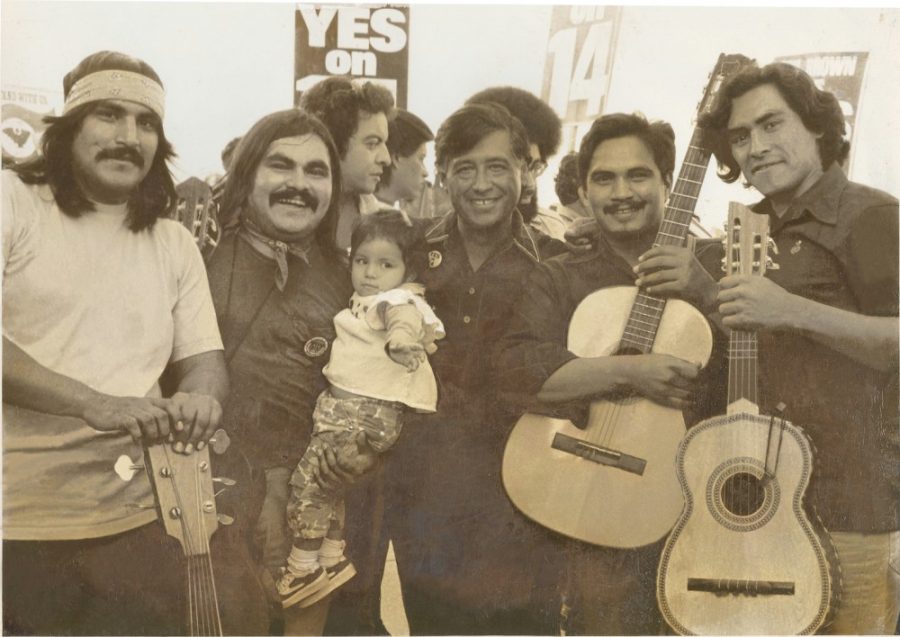From his humble beginnings as a farmworker to becoming one of Cesar Chavez’ favorite musicians, Ramon “Chunky” Sanchez has had anything but an ordinary life. Now his story is coming to the big screen and to the University of Arizona.
“Singing Our Way to Freedom,” a documentary based on Sanchez’ life, is premiering for the first time in Tucson at Gallagher Theatre in the Student Union Memorial Center, followed by a Q&A with the film’s director, Paul Espinosa.
“[Sanchez] was a very charismatic musician and activist,” Espinosa said. “He is somebody that I saw often, and he was very dedicated to his art and his activism.”
RELATED: Q&A: Space round table to bring new topics to campus
In the 1960s, Sanchez joined Chavez and the fight for farmworkers and better wages. Soon he discovered that creating music could help fight discrimination. Sanchez’ music influenced Chicanos and Chicanas everywhere to stand up and have their voice heard, which eventually led him to receive one of his nation’s highest musical honors from the National Endowment for the Arts, according to Espinosa.
“I felt that his story was something that would be really important to tell more people about rather than just the San Diego community,” Espinosa said.
Espinosa said his film provides an in-depth, personal look at Sanchez’s life using interviews from Sanchez himself and people who knew him.
“It involves many interviews from many people, including Chunky when he was still alive, other people that knew him and musicians that played with him,” Espinosa said.
Aside from interviews, Espinosa also included archived material that showed the various time periods in Sanchez’ life, such as the Chicano civil rights movement.
“It is a film that really does deal with a number of different periods of time, including the Chicano civil rights movement,” Espinosa said. “The film has quite a bit of archival material, so it also involved a lot of tracking down materials from various sources. It was a matter of tracking down all that stuff and finding a way to put it all together into a finished film.”
RELATED: TSC seeks to give transfer students the full UA experience
Estevan Azcona, one of the academic consultants for the film, said the archived material was one of his favorite parts of the documentary.
“My favorite part of the film is the archival footage from the ’60s and ‘70s,” Azcona said. “We don’t get to see that as much today.”
Most importantly, Espinosa’s film is able to share Sanchez’ powerful message and his fight for social change. The film also highlights some of the issues the Hispanic community still faces, Espinosa said.
“One of the things we see in Chunky’s story is a long commitment to social change and social justice,” Espinosa said. “His music and his life were dedicated to improving the lives of others. He was very involved with immigration issues and played at countless of rallies involving immigrant rights.”
Espinosa said he hopes that people will leave inspired by Sanchez’ story and feel encouraged to fight for change like Sanchez.
“It will give people the idea that the struggle for social justice is something that has been going on for a long time and will probably go on in the future,” Espinosa said. “We have to keep at it, because to get justice and freedom for people, it requires constant vigilance to make sure that we don’t violate the rights of people. You see that in the film very much.”
Michelle Tellez, an assistant professor for Mexican American studies at the UA and an advisor for the film, said that besides his part in the Chicano movement, Sanchez’ strong bond with his hometown is something that makes his story stand out.
“Throughout his life, Chunky always had a relationship to his hometown and to his community through his music. It was really beautiful to see that,” Tellez said.
Before “Singing Our Way to Freedom” made its way to Tucson, it was shown at the San Diego Latino Film Festival. At the festival, the film won the audience award for best documentary.
“It was very well received,” Espinosa said. “We were really pleased. It had three sold-out screenings. It was gratifying.”
Téllez, who grew up in San Diego, was motivated to bring the documentary to Tucson because of her connection with Sanchez’ story.
“Since I’m from San Diego, I know his music and know the park that he helped create. I really wanted to bring that experience to Tucson,” Tellez said.
The screening of the documentary is not only the first time the film will be in Tucson, it also allows the community to learn about a history and musical genre they might be unfamiliar with.
“I wanted to present this story in a way that would be both engaging for the audience as well as informative about the period that he lived through and the achievements that he had,” Espinosa said.
“Singing Our Way to Freedom” premieres in the Gallagher Theatre on Feb. 27 at 6 p.m.
Follow Jamie on Twitter









